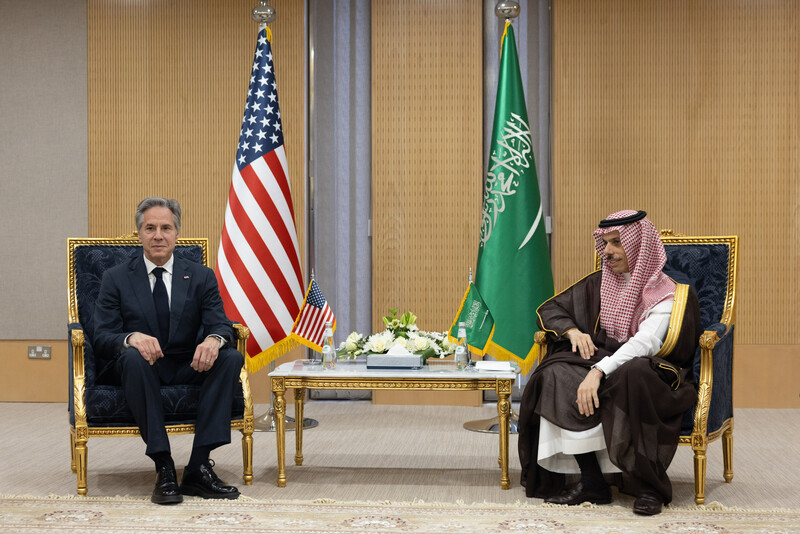The Electronic Intifada 7 May 2024

Saudi Foreign Minister Prince Faisal bin Farhan Al Saud meets US Secretary of State Antony Blinken in Riyadh on 29 April.
Polaris/NewscomUS Secretary of State Antony Blinken collected more stamps in his passport last week.
Yet another tour of America’s allies in the region saw Washington’s chief diplomat make stops in Riyadh, Amman and Tel Aviv.
The first stop garnered the most media attention even if the last stop was the most revealing, illustrating in full the extent to which America’s diplomatic efforts have fallen short over Gaza, and will continue to fall short as long as the US administration continues to tiptoe around the consequential measures it needs to impose to force Israel to fall in line.
As Israel begins its Rafah operation, one thing is abundantly clear: Benjamin Netanyahu and his government do not care what the US wants, only what the US is willing to go along with.
And Hamas’ decision on Monday to accept a ceasefire proposal is clearly meant as a test for Washington, which has proven singularly unwilling to put the necessary political capital at risk to end Israel’s genocide in Gaza.
Nothing illustrated that better than Blinken’s attempt in Saudi Arabia, on the sidelines of the World Economic Forum, to push forward the stalled bid for a Saudi-US security agreement that is meant to include Saudi normalization with Israel in what is touted as a “grand bargain.”
Initial reports suggested a deal was close but that it would initially, at least, skirt the normalization issue and focus mostly on a bilateral security deal that would see the US grant Riyadh security guarantees, as well as Saudi access to more advanced weaponry, in return for halting Chinese arms purchases and investments in the country.
But a few days later, White House officials poured cold water on efforts to disentangle the US-Saudi portion of the deal from the normalization issue.
“The integrated vision is a bilateral understanding between the US and Saudi Arabia combined with normalization between Israel and Saudi Arabia, combined with meaningful steps on behalf of the Palestinian people,” Jake Sullivan, the US national security adviser, told Britain’s Financial Times. “All of that has to come together . . . you can’t disentangle one piece from the others.”
With or without
The normalization portion of this “integrated vision,” Blinken had told a panel at the WEF in Riyadh, requires two things: “calm in Gaza and a credible pathway to a Palestinian state.”
Both foundered in Israel. Prime Minister Benjamin Netanyahu has been quite clear that he opposes Palestinian statehood, and he is overwhelmingly supported by the Knesset, the Israeli parliament.
And in the days between Blinken’s assertion in Riyadh and Sullivan’s remarks to the FT, Netanyahu also made it clear that there would be no “calm” in Gaza, vowing instead to push ahead with a Rafah assault that UN officials warn could cause “slaughter” and “cripple” efforts to provide humanitarian aid to Gaza’s 2.3 million people, currently suffering an Israeli-imposed famine.
“With or without a deal,” Netanyahu said about ceasefire negotiations in Cairo that at that point had been the cause of some optimism, Israel would push ahead with its Rafah assault in order to ensure “total victory.”
Blinken gamely tried to blame Hamas for rejecting a ceasefire proposal he described as “extraordinarily generous,” even though it was another temporary ceasefire that did not stipulate a permanent end to the Israel’s assault, a key Hamas demand.
“Blinken’s comments contradict reality. It is not strange for Blinken, who is known as the foreign minister of Israel, not America, to make such a statement,” said Hamas official Sami Abu Zuhri.
And even an Israeli official close to the negotiations told The New York Times that it was Netanyahu’s “with or without” position that had undermined negotiations.
What’s plain to see
With Israel now launching its invasion of Rafah, Washington’s diplomacy is completely exposed.
Despite the US administration having repeatedly voiced opposition to an Israeli offensive on Rafah, it is clear that whatever is said behind closed doors has little purchase with Netanyahu and his war cabinet.
The fact that, a day before welcoming Blinken to Tel Aviv, Netanyahu felt completely comfortable contradicting the US position shows the level of impunity Israel feels it has with the US.
Why wouldn’t it? The US has never taken Israel to task for its many and violent transgressions of international law, not least and most obviously by allowing it to maintain an illegal military occupation for close to six decades that is constantly consolidated with settlements.
In the US, the political price any serious pressure on Israel might exact in an election year is clearly proving a far bigger consideration than putting the brakes on Israel’s genocide in Gaza.
You can see why.
US support for Israel in Evangelical circles – an important voting bloc for many legislators – is seen as a “religious duty” in line with Biblical prophecy.
Such religious fervor is not confined to ordinary voters. Last month, Mike Johnson, the Republican speaker of the House of Representatives, in declaring his support for yet another massive US aid and weapons package for Israel, announced that his position was a “biblical admonition.”
Combined with a Holocaust narrative that sees Israel as the only guarantor of Jewish safety worldwide, this explains why students protesting mass murder and mass destruction in Gaza are vilified as racists rather than understood plainly as anti-war protesters.
Hopelessly devoted
Add in an oft-asserted “shared values” canard that Israel is the only democracy in the Middle East – even though this “democracy” makes distinction in law between sets of people and grants different rights based on their religious and ethnic backgrounds, also known as apartheid; even though this “democracy” was created 76 years ago after a massive act of ethnic cleansing never rectified; and even though this “democracy” has engaged in a violent military occupation of another people for 57 years denying them their rights and freedom – and US support for Israel becomes a closed circle of self-reinforcing irrational nonsense.
With such extreme devotion to Israel, it is no surprise that senior US politicians – led by Republican Tom Cotton, a senator from Arkansas who would rather have Americans throw other Americans off bridges than allow some to register their disgust with Israel’s unhinged behavior – are threatening dire consequences for officials from the International Criminal Court (and their families) should the ICC move to indict any Israeli officials for the many clear and obvious war crimes Israel has committed over the past seven months in Gaza.
America’s pro-Israel delirium has hamstrung US diplomacy and made America complicit with Israel’s many war crimes. It’s a fair bet that Blinken’s assertion that a Saudi deal would happen only with a “credible pathway” to a Palestinian state would have been met with guffaws from the same Arab foreign ministers with whom Blinken met in Riyadh and who otherwise rarely fail to bow to American diktats.
What is left of US credibility when the US has shown over the past seven months that no statement from Washington is taken seriously in Tel Aviv?
Why should anyone else?
And it is not hard to see why countries, even staunch US allies like the United Arab Emirates, are increasingly turning to China, whose growing influence in the region – which seems largely based on it not being America – the US is explicitly trying to forestall with a Saudi deal that Israel has now effectively vetoed.
What Washington wants
As Hamas official Osama Hamdan put it before Hamas announced its acceptance of a phased permanent ceasefire proposal on Monday, the real issue is what Washington wants.
“If the United States administration has said clearly to Netanyahu ‘enough is enough’ … I assure you that will happen,” Hamdan told Al Jazeera, which has now been banned in Israel (those “shared values” again).
“The one who is supposed to answer the questions now is the Americans and no one else.”
Indeed.
There are some signs that the US is shifting gears. It has emerged that last week the US administration “halted” a shipment of ammunition headed for Israel, though US officials were at pains to explain that this had nothing to do with Gaza.
Whether it was meant as a signal to Israel or not, it has clearly had no effect.
Equally clearly, if the US wants to end the mass slaughter in Gaza, words and signals are no longer enough.
And if Palestinian lives are not enough incentive, perhaps the White House should consider what Israel is increasingly demanding of it: nothing less than the wholesale dismantling of a post-World War II international order set up precisely to prevent the mass murders and mass atrocities that war witnessed, and that are now being repeated in Gaza.
What else does it mean when the Israeli UN ambassador Gilad Erdan demands that the US “completely stop funding the UN and its institutions” should UN members vote for Palestinian statehood?
The post-war order has served Western countries well over the years. But an increasingly assertive Global South is now demanding that it be implemented equally everywhere.
Including Israel.
The US has plenty of options. It can implement an arms embargo on Israel.
It can withdraw financial support for Israel. It can exercise its considerable power to demonstrate that it takes seriously its self-appointed role as guarantor of international order and “leader of the free world.”
All of this will seem unpalatable to Joe Biden, a staunchly pro-Israel president facing what by all accounts appears a close election race in November.
But that is the choice he faces: Israel or everyone else.
Omar Karmi is associate editor of The Electronic Intifada and a former Jerusalem and Washington, DC, correspondent for The National newspaper.





